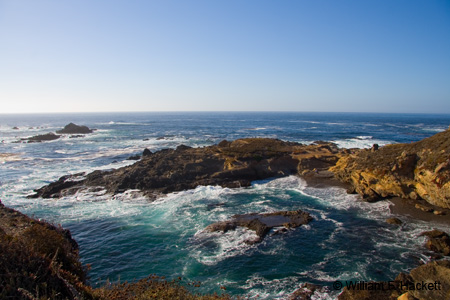Homo sapiens too stupid to survive?

“It has yet to be proven that intelligence has any survival value.” – Arthur C. Clarke
(As quoted in Duh! : The Stupid History of the Human Race (2000) by Bob Fenster, p. 208)
Well, “there’s a first time for everything!” 
Some of the (ahem, ahem) “more MATURE” of you may recall the science fiction movie, Soylent Green (1973; Charleton Heston, Edward G. Robinson), in which most of the world’s population survives on rations made by the Soylent Corporation, supposedly from oceanic plankton, but, alas, we learn that humankind has killed even the oceans, and Soylent Green is made from recycling the bodies of dead humans, including those from suicide “parlors.”
Well, humans have not been content to leave such matters in the realm of science fiction. As Einstein said, “The difference between genius and stupidity is that genius has its limits.”
The Census of Marine Life, a decade-long international survey of ocean life completed in 2010, estimated that 90% of the big fish had disappeared from the world’s oceans, victims primarily of overfishing.
Wait until climate change and ocean acidification REALLY “kick in!”  As CNN.com says:
As CNN.com says:
Tens of thousands of bluefin tuna were caught every year in the North Sea in the 1930s and 1940s. Today, they have disappeared across the seas of Northern Europe. Halibut has suffered a similar fate, largely vanishing from the North Atlantic in the 19th century.
In some cases, the collapse has spread to entire fisheries. The remaining fishing trawlers in the Irish Sea, for example, bring back nothing more than prawns and scallops, says marine biologist Callum Roberts, from the UK’s York University.
“Is a smear of protein the sort of marine environment we want or need? No, we need one with a variety of species, that is going to be more resistant to the conditions we can expect from climate change,” Roberts said.
The situation is even worse in Southeast Asia. In Indonesia, people are now fishing for juvenile fish and protein that they can grind into fishmeal and use as feed for coastal prawn farms. “It’s heading towards an end game,” laments Roberts.
The indiscriminate nature of bottom trawling is blamed for much of the damage. Bottom trawling “…involves dropping a large net, around 60 meters-wide in some cases, into the sea and dragging it along with heavy weights from a trawler.” CNN.com continues:
Marine conservationists compare it to a bulldozer, with the nets pulled for as far as 20km, picking up turtles, coral and anything else in their path. The bycatch, unwanted fish and other ocean life thrown back into the sea, can amount to as much as 90% of a trawl’s total catch.
Upwards of one million sea turtles were estimated to have been killed as by catch during the period 1990-2008, according to a report published in Conservation Letters in 2010, and many of the species are on the IUCN’s list of threatened species.
The oceans produce up to 50% of the oxygen that we breathe, and they absorb up to 1/3 of the carbon dioxide emissions that humans produce. Unfortunately, the absorption of the carbon dioxide results in an acidification of the oceans. CNN.com says:
“The two worst things in my mind happening to oceans are global warming and ocean acidification,” says O’Dor, “They’re going to have terrible effects on coral reefs. Because of acidification essentially, the coral can’t grow and it’s going to dissolve away.”
The ocean has become 30% more acidic since the start of The Industrial Revolution in the 18th century and is predicted to be 150% more acidic by the end of this century, according to a UNESCO report published last year.
“There’s a coral reef off Norway that was discovered in 2007 and it’s likely to be dead by 2020,” says O’Dor.
“The problem is that the acidification is worse near the Poles because low temperature water dissolves more acid. Starting from the Pole and working south these reefs are going to suffer extensively.”
Current estimates suggest 30% of coral reefs will be endangered by 2050, says O’Dor, because of the effects of ocean acidification and global warming.
Higher acidity also disrupts marine organisms’ ability to grow, reproduce and respire. The Census of Marine Life reported that phytoplankton, the microscopic plants producing most of the oxygen from the oceans, have been declining by around 1% a year since 1900.
Soylent Green, anyone? 
The problem is that most of the world’s ocean is located outside of international law and legal control. Any attempts to implement rules and regulation come with the problem of enforcement, says <Alex> Rogers, who is also scientific director of the International Program on State of the Ocean (IPSO).
So, since it is largely the stupid (and aggressive) people who run the world, Arthur C. Clarke may yet be proven right, perhaps within the lifetimes of my own children, and almost certainly, within the lifetimes of THEIR children.
Or… if we have not yet reached an environmental “tipping point,” perhaps there is time to reverse the damage that we have done.
(Note: The Monterey Bay Aquarium’s “Seafood WATCH” app is available for both Android and iPhone to help you find “Ocean-Friendly” seafood.)
-Bill at
Cheshire Cat Photo™ – “Your Guide to California’s Wonderland™”
You can view higher-resolution photos at the Cheshire Cat Photo™ Pro Gallery on Shutterfly™, where you can also order prints and gifts decorated with the photos of your choice from the gallery. The Cheshire Cat Photo Store on Zazzle® contains a wide variety of apparel and gifts decorated with our images of California. All locations are accessible from here. LIKE Cheshire Cat Photo on Facebook here! If you don’t see what you want or would be on our email list for updates, send us an email at info@cheshirecatphoto.com.







